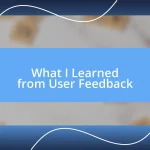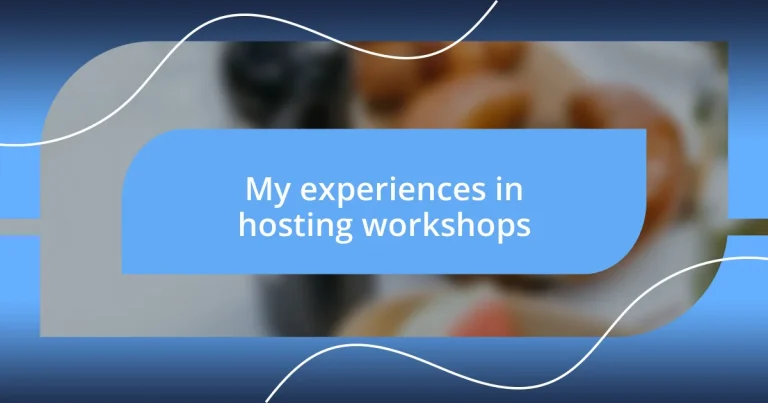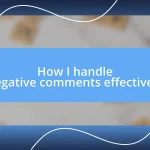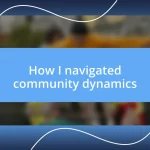Key takeaways:
- Embrace storytelling and unexpected moments to foster deeper connections and engagement with participants during workshops.
- Preparation, including crafting a structured agenda, choosing the right venue, and having materials ready, significantly enhances the workshop experience.
- Gathering and acting on feedback, both formal and informal, is crucial for continuous improvement and creating a community within the workshop environment.
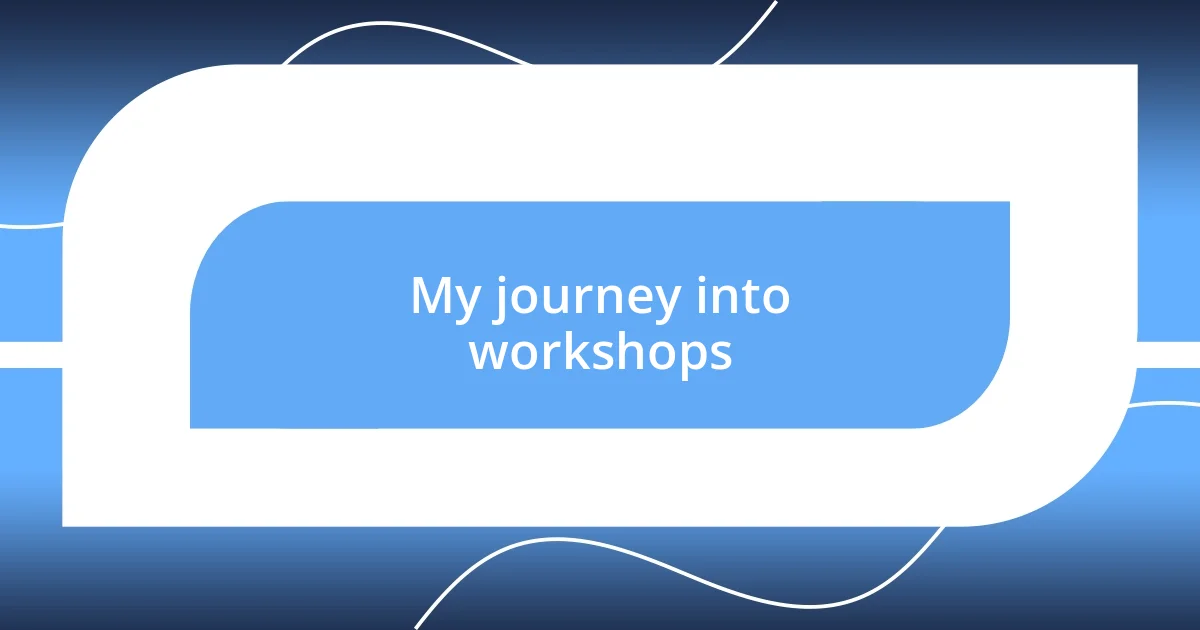
My journey into workshops
I still remember my first workshop with a mix of excitement and nerves. Standing in front of that small group, I felt the weight of their expectations, yet there was something exhilarating about sharing my knowledge. Have you ever felt that rush of adrenaline when you realize you’re making a connection with your audience?
As I delved deeper into hosting workshops, I discovered the power of storytelling. One time, I shared a personal experience about a challenging project, and the room shifted; suddenly, everyone was engaged, nodding along as if they were sharing the journey with me. It struck me then—how can we connect more deeply through our stories?
Over time, I learned to embrace the unpredictability of workshops. One particular session went off-script when a participant raised a challenging question that took me by surprise. Instead of panicking, I embraced the moment, and we had an incredibly rich discussion that transformed the workshop. It taught me an invaluable lesson: sometimes, the best experiences come from the unexpected.
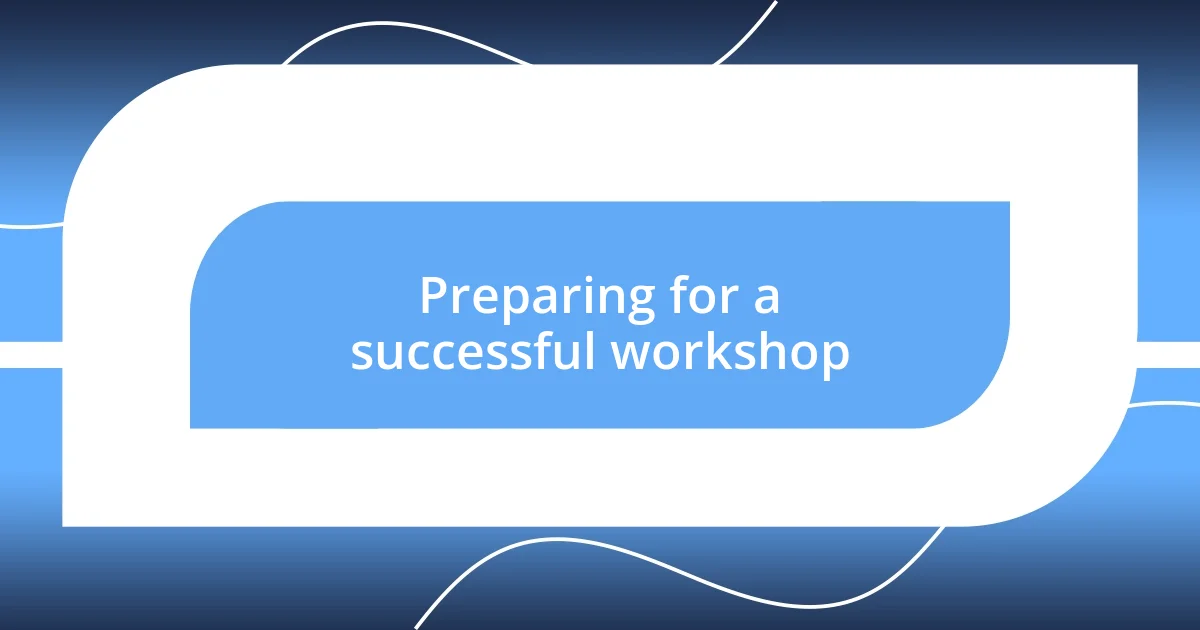
Preparing for a successful workshop
Preparing for a successful workshop means diving into the details long before the event starts. I remember spending hours developing a well-structured agenda that not only outlined the topics but also included time for interaction. This approach kept participants engaged and allowed them to actively contribute, turning a passive session into a dynamic discussion. Isn’t that the kind of learning environment we all thrive in?
In the early days, I often underestimated the importance of the physical space. One time, I chose a cramped room that stifled conversation and creativity. From that experience, I learned that having a welcoming and comfortable venue can dramatically impact the flow of the workshop. When I switched to larger, well-lit spaces, it was like flipping a switch; participants became more open and forthcoming with their ideas.
Something I regard as essential is preparing materials in advance. In my early workshops, I was often scrambling to gather handouts last minute. Now, I find that preparing comprehensive materials not only helps participants follow along but also allows me to focus more on delivering my message and engaging with the audience, rather than being caught up in logistics. Preparation truly transforms the experience for everyone involved.
| Aspect | Importance |
|---|---|
| Agenda | Provides structure and focuses attention |
| Venue | Affects participant engagement and comfort |
| Materials | Enhances learning experience and clarity |
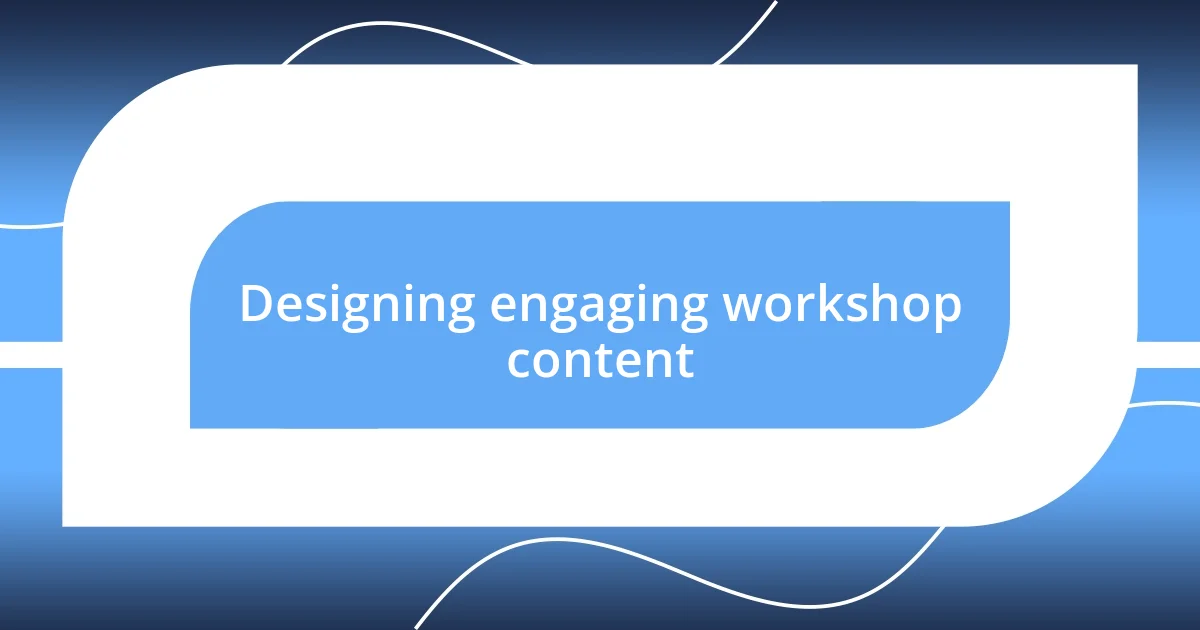
Designing engaging workshop content
Designing workshop content that truly engages participants is a blend of preparation and inspiration. I remember a time when I created a hands-on activity that had everyone moving around the room. The energy shifted dramatically; instead of just listening, participants were collaborating and brainstorming, and it felt like the room buzzed with creativity. Seeing that enthusiasm reinforced my belief in incorporating interactive elements into my workshops.
To create content that resonates, consider these key points:
- Know Your Audience: Tailoring your content to fit the interests and knowledge levels of your participants is crucial.
- Incorporate Interactive Elements: Activities like group discussions or role-plays energize participants and keep them involved.
- Utilize Visual Aids: Engaging visuals help reinforce key messages and can spark more interest in the subject matter.
- Tell Personal Stories: Sharing relatable experiences can bridge gaps between you and your audience, fostering a more connected learning environment.
When I started integrating these strategies, I noticed participants were more willing to share their thoughts and experiences. It was as if the workshop transformed into a shared journey of exploration rather than just a transfer of knowledge.
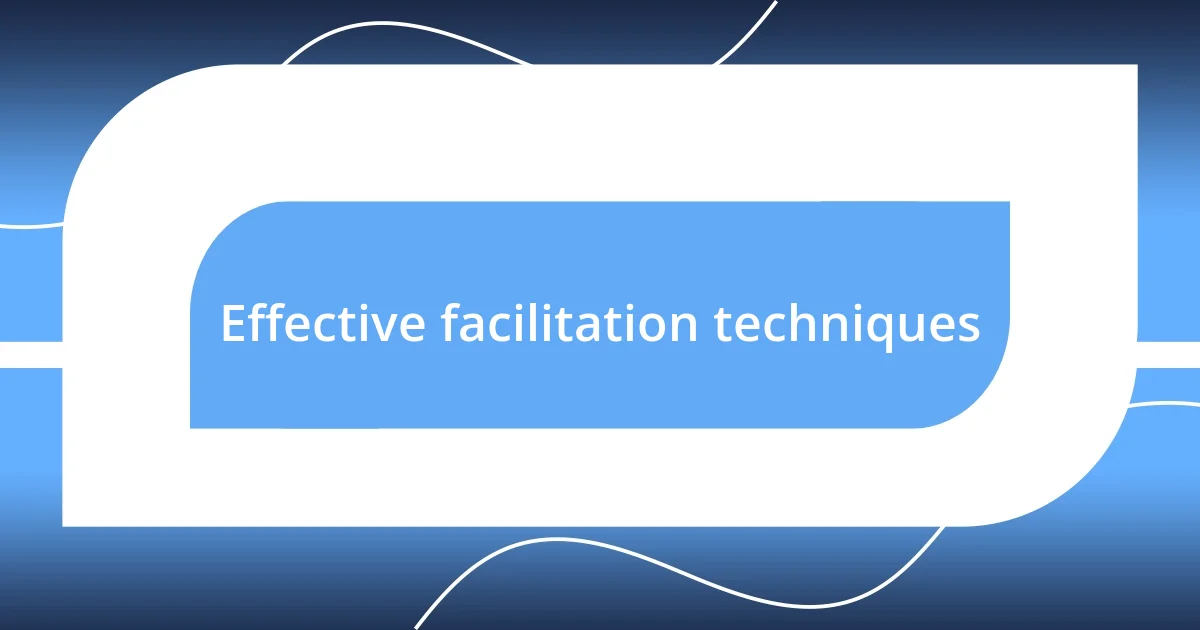
Effective facilitation techniques
Effective facilitation is the heartbeat of any workshop. One technique I find invaluable is the power of active listening. The first time I consciously practiced this, I noticed a shift in the room’s energy; participants felt heard and valued. They opened up in ways I hadn’t experienced before, sharing insights that enriched the discussion. It made me realize—how often do we truly listen in conversations?
Another approach that significantly impacts my workshops is creating a safe environment for sharing ideas. I remember a workshop where I encouraged a ‘no judgment’ rule, and it was like a floodgate opened. Participants began to express their thoughts without hesitation, fostering a rich dialogue. Wouldn’t it be wonderful if every workshop could feel like a safe haven for ideas?
Incorporating varied questioning techniques is also key. I tend to alternate between open-ended questions that invite discussion and targeted questions to keep the conversation focused. This balance has led to deeper conversations; for instance, after posing a thought-provoking question, I often stay quiet to let the silence encourage reflection. Isn’t it fascinating how a bit of silence can lead to profound insights?
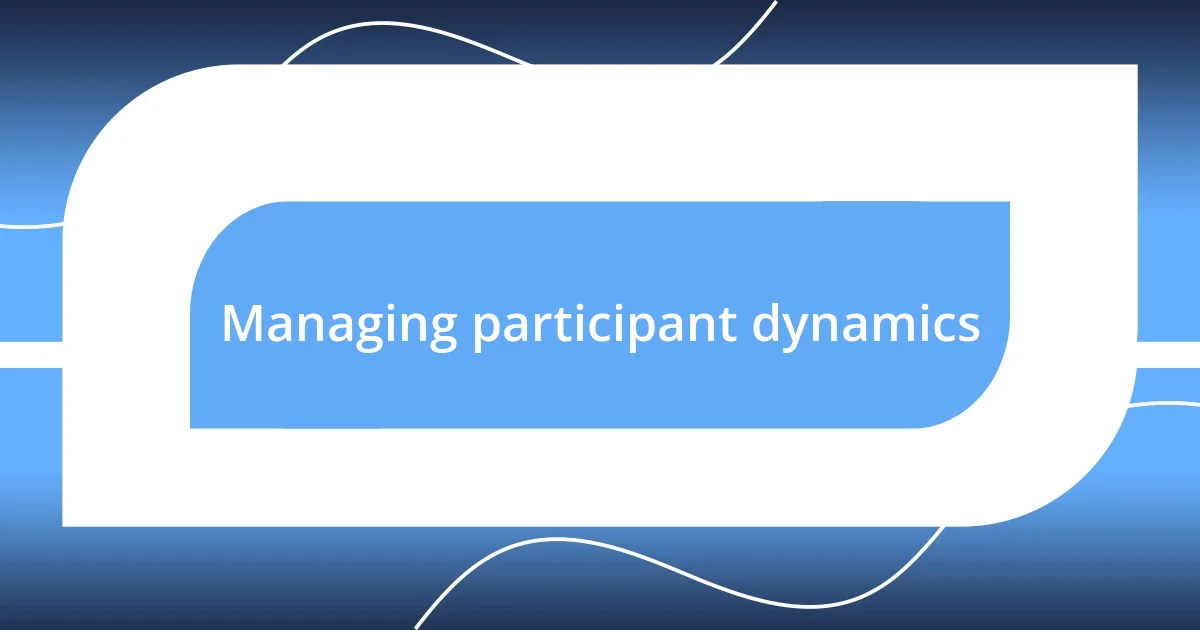
Managing participant dynamics
Managing participant dynamics is an art that requires sensitivity and adaptability. During one workshop, I noticed a couple of participants who were particularly dominant in discussions. Rather than letting this overshadow quieter individuals, I made a conscious effort to invite quieter voices into the conversation. It was amazing to see them light up with the encouragement, proving that even a small nudge can change the dynamics in a room.
The energy in workshops is fluid, and I’ve learned to read the room to understand the shifts in engagement. I remember a session where participants began to disengage halfway through. Recognizing this, I pivoted to a quick icebreaker that reignited their enthusiasm. The laughter that followed reminded me of how important it is to keep things lively and responsive—after all, how can participants engage deeply if they aren’t excited about what’s happening right then and there?
Navigating differing personalities can feel like a balancing act at times. I’ve found that when I share a bit about my own hesitations in group settings, it creates a commonality with participants. There was a time when I admitted my own struggles with speaking up in large groups, and suddenly, I could see more than a few heads nodding in understanding. Isn’t it interesting how sharing vulnerability can transform the space into one of trust, allowing participants to support each other?
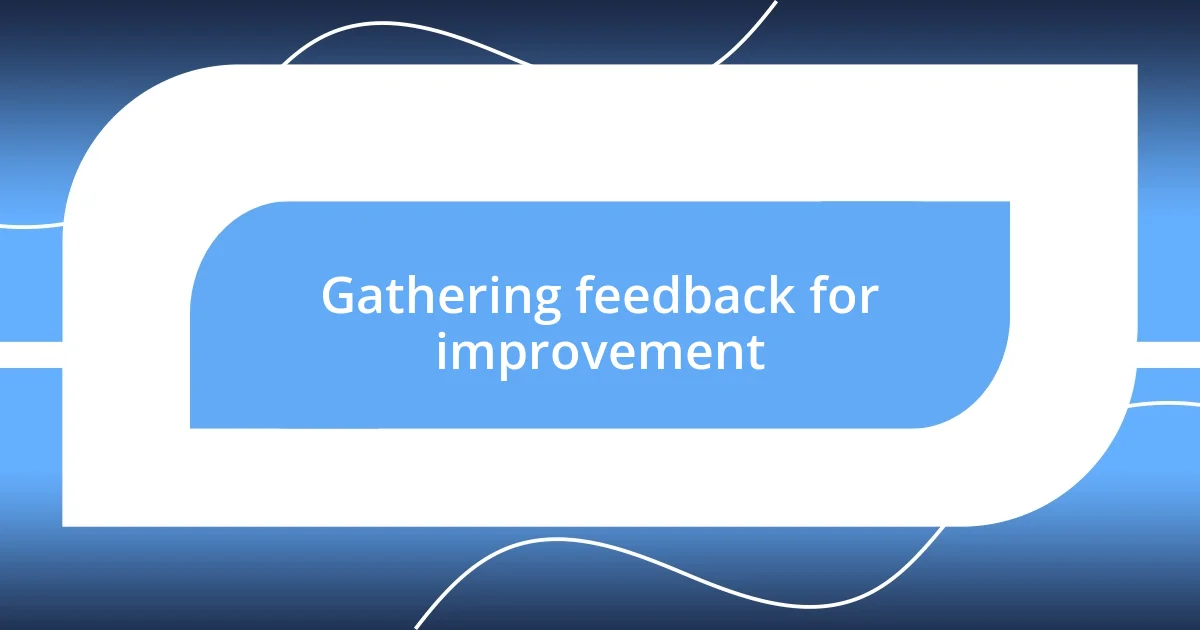
Gathering feedback for improvement
Gathering feedback is an essential part of refining my workshop approach. After each session, I’ve started using anonymous surveys to capture honest opinions, which has been eye-opening. I remember one particular instance when a participant pointed out that certain activities felt rushed; that feedback helped me adjust the pacing in future workshops. Isn’t it amazing how a simple suggestion can enhance the entire experience?
During my early days of hosting, I relied solely on verbal feedback. One afternoon, a participant mentioned that their thoughts were often drowned out by others. This experience prompted me to implement structured feedback sessions where everyone gets a chance to share their reflections—both positive and constructive. I never realized how valuable those moments could be until I saw the excitement in participants’ eyes when they felt their voices truly mattered.
I’ve also found that informal conversations after the workshop can yield rich insights. One day, I lingered a bit longer to chat with attendees, and one shared an idea that transformed my approach to participant engagement. Listening intently to those informal nuggets of wisdom not only builds rapport but also creates a genuine sense of community. How often do we miss out on valuable feedback because we rush off after the closing remarks?
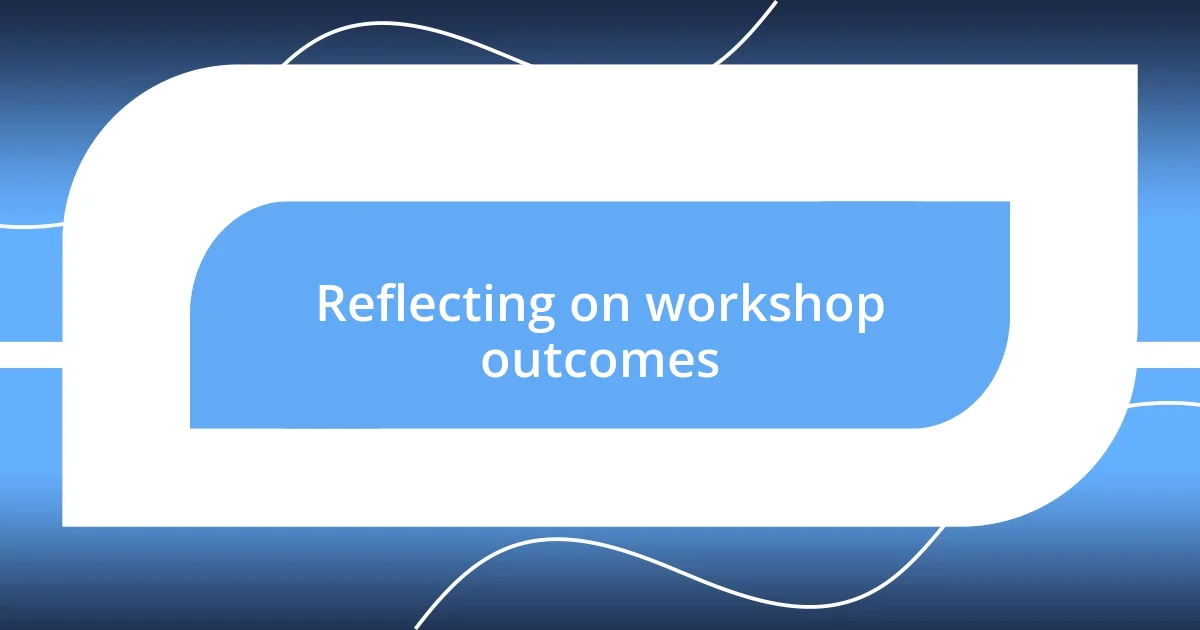
Reflecting on workshop outcomes
Reflecting on the outcomes of my workshops often brings both surprises and affirmations to the surface. I remember one session where my intention was to inspire creativity, yet I discovered that many participants were seeking practical tools instead. This realization hit me hard. I learned that sometimes we can miss the mark simply by not aligning our goals with the attendees’ needs. Have you ever realized mid-way through a project that it isn’t quite what your audience was hoping for?
An unexpected shift in outcomes came when I noticed a powerful bond forming among participants. One workshop, seemingly routine, saw individuals opening up about personal challenges that intertwined with the theme. Witnessing this emotional sharing was profound—empathy flowed, and the discussions became richer. I found myself thinking, how incredible is it that workshops can forge connections that might not occur in any other setting?
Looking back, one of the most impactful outcomes I’ve seen is not just the knowledge shared, but the courage participants gain. There was a moment in a particularly vulnerable session when someone who had never spoken in public took a leap and shared their story. The room erupted in applause, and you could feel a tangible wave of encouragement washing over them. How often do we overlook that awakening of confidence? It’s a reminder that outcomes extend far beyond just skill acquisition; they encompass personal growth, too.




